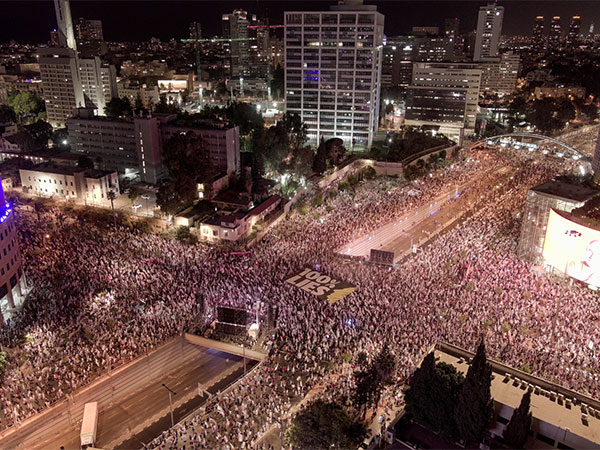

Masses rallied nationwide on Saturday evening for the 31st consecutive week against the government’s attempt to overhaul the judiciary. The main rally was held in Tel Aviv in the shadow of a fatal Palestinian terror attack in the city that took place just as the demonstrations were beginning, The Times of Israel reported.
Some 105,000 people were estimated to have attended the main rally at Tel Aviv’s Kaplan Street, which began following a march from Kikar Dizengoff at 7 pm, around when the shooting attack took place elsewhere in the city.
Tel Aviv municipal security officer Chen Amir, 42, was shot and killed by a member of the Palestinian terror group after the terrorist raised officers’ suspicion in the bustling Nachalat Binyamin neighbourhood. The terrorist was shot dead by Amir’s colleague, and a senior police source was later quoted by the Ynet news site as saying the gunman had possibly planned to target the anti-overhaul protesters at Kaplan, The Times of Israel reported.
In light of the attack, protest organizers held the mass rally as planned, with increased police presence and without music being played from the loudspeakers during the demonstration. They also didn’t move to block roads, as they have in most weeks after the rally, in order to not complicate access for the security forces and emergency services in the attack’s aftermath.
The rallies were also taking place amid Prime Minister Benjamin Netanyahu’s continued refusal to confirm he would adhere to a potential court ruling striking down the reasonableness law, and as members of the hard-right government have increasingly turned up the heat on legal advisers and other professionals, claiming these have been hindering the implementation of the government’s policies, The Times of Israel reported.
Other rallies were held in about 150 other locations around the country, including thousands near Netanyahu’s private residence in Jerusalem as well as thousands in Haifa, Herzliya, Netanya, Hod Hasharon, Rehovot and many other cities.
Last week, lawmakers approved a bill that prevents judges from striking down government and ministerial decisions on the basis they are “unreasonable.”
The law was approved by all 64 coalition members — with the entire 56-strong opposition boycotting the vote — despite the sustained mass protests, vehement opposition from top judicial, security, economic and public figures, repeated warnings from allies, chief among them the US, and thousands of military reservists vowing to quit service.
Petitions against the law have been filed to the High Court, with an unprecedented 15-judge panel to hear them next month, The Times of Israel reported.
On Thursday, the High Court of Justice asserted in no uncertain terms that it views a recently passed law blocking the court from ordering the prime minister to recuse himself as a highly personal piece of legislation and implied that it is considering an explosive ruling which would delay implementation of the law. It is unclear when a ruling will be handed down.
Netanyahu’s hardline coalition government, which includes far-right and ultra-Orthodox parties, argues that the proposed changes to the judiciary are needed to ensure a better balance of power between elected officials and judges.